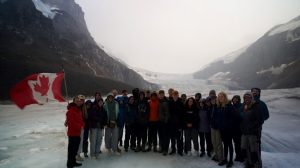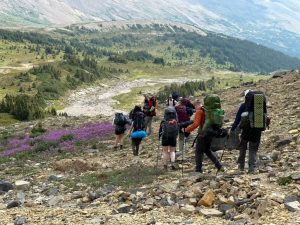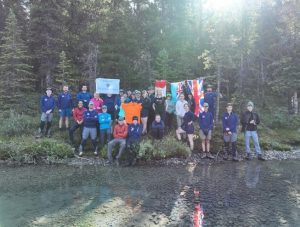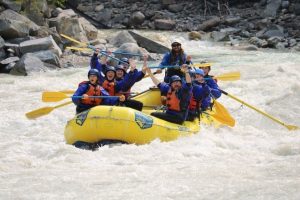On the 26th of July 2023, a team of twenty-two cadets and eight Cadet Force Adult Volunteer instructors embarked on Exercise Mountain Storm. This remarkable journey encapsulated the essence of the third aim of the Royal Air Force Air Cadets: “To foster a spirit of adventure and cultivate qualities of leadership and good citizenship”. The participants came together from three regions, eight wings and twenty-four squadrons across the UK to take part in a unique opportunity, beckoning us into the expanse of the Canadian Rocky Mountains White Goat Wilderness Area. The primary aim was to complete a 6-day highly remote and unsupported mountaineering expedition, followed by a week of diverse activities and excursions across Banff National Park, a World Heritage Site.
The venture not only enriched everyone through the rigours of adventure training but also granted an insight into the cultural tapestry of a country over 4000 miles away from home. The leaders of the local First Nation community welcomed us to Canada with a message read out to all of the Mountain Storm participants, a poignant moment highlighting the long and proud history of the indigenous people.
Something that set this expedition apart from the get-go was the extraordinary level of responsibility entrusted to the cadets. Unlike most camps within the Air Cadets, they were not mere participants but architects of their own adventure. Starting with the first training weekend in November 2022, they organised themselves into five sub-teams to plan activities, media, catering, finance and logistics. It meant that every cadet had a direct contribution to the expedition planning and delivery, exercising decision-making skills, resourcefulness, and adaptability. This approach catalysed a series of challenges, nurturing their ability to make informed decisions, lead confidently and collaborate effectively both within their own teams as well as with the other teams and staff.
An extensive amount of preparation was required, undertaken during a series of training weekends spread over ten months. Many cadets initially possessed limited or no prior experience of wild camping or the rigours of long multi-day trekking. The training weekends were prime occasions for the cadets to gain insights from experienced staff members and practise the essential skills needed to be successful. The collective teamwork skills were also honed through understanding each team member’s capabilities and vulnerabilities, which better allowed everyone to look out for one another.
Fundraising was a significant activity given the substantial scope of activities we aimed to undertake, coupled with the necessity of purchasing team equipment. A large fundraising effort was required and owing to the wide geographical distribution of cadets a collective fundraising endeavour proved impractical. Individual initiatives were encouraged and orchestrated to raise funds effectively. Sgt Noah Barker, who went the extra mile and raised £2,025 worth of funds and equipment, discussed the importance of Mountain Storm and fundraising to him:
“I think fundraising for the trip was really important as it made all the cadets take on more responsibility and required our active involvement in activities or communication that we would otherwise not be used to. The huge benefits of our fundraising were obvious to us during the trip and allowed us to have amazing experiences such as enjoyable activities and meals. The trip is important to me as I know the memories will last a lifetime and not many opportunities like this will come around again. The trip pushed me both mentally and physically from day one and has allowed for the development of the whole team both individually and as a group. Mountain Storm shows the hard work and dedication that the staff team put in, which enabled us to have such an incredible adventure.”
Sgt Noah Barker
The cadets were not alone in the fundraising endeavours, owing to the generous support extended by the Ulysses Trust and the remarkable backing received from the Canadian Air Cadets in Canmore, Canada. This invaluable support included granting access to 878 Squadron facilities, along with the provision of essential equipment like tents, ration packs, cooking pots and stoves – all of which played integral roles in the expedition. Moreover, their hospitality extended to hosting a distinguished “dining in” evening, providing a unique platform for everyone to engage with both the Canadian staff and cadets. The evening facilitated interesting discussions comparing the intriguing similarities and differences of our cadet forces, including rank structures, parade nights, activities and camps. Captain Christian Stenner of the Canadian Defence Forces proved to be a fascinating guest speaker, describing his involvement in exploring the longest and deepest caves in Canada and highlighting the importance of teamwork in those endeavours. Undoubtedly, the evening marked a special highlight among the many memorable moments of the journey.
The UK based training thoroughly prepared the team prior to travel, with additional wildlife training delivered by local experts on arrival in Canada. When problems were encountered both the technical and interpersonal skills helped the cadet team to find solutions. For the majority, these trials emerged during the expedition phase of the journey, wherein its demanding character and challenging terrain pushed many to their limits, both physically and mentally. The first major challenge was where to camp at the end of the first day. A long trek and very steep terrain at Cataract Col meant that pressing on to the ideal camp location was out of reach and an alternative higher-level camp was utilised instead. Similarly on day two the little-used trail was indistinct and progress was harder than expected through the densely wooded backcountry.
The team finally reached Pinto Lake on the third day, a day later than initially planned. The physical challenge of the trail and backpacking unsupported for six days weighed heavily on some members of the team. It presented a pivotal moment compelling the cadets to unite and persevere. The remaining route was re-evaluated, options identified, and following a cadet team discussion a challenging route was selected that would be achievable by all participants. The terrain provided some tricky river crossings that led to a refreshing splash for a few individuals, while day to day challenges of living outdoors were overcome with insect bites and minor ailments dealt with quickly to protect the individual, and also each other. Nevertheless, it’s safe to say that everyone cherished the experience and would readily embark on it again, enticed by the breath-taking views, grandeur of the mountains, the allure of Pinto Lake, and the camaraderie that we all shared.
The end of the expedition did not mark the end of our enjoyment; in fact, it was just the beginning of an array of meticulously planned activities that unfolded in the week to come. Certain activities emerged as clear favourites, including white-water rafting, horseback riding, and mountain biking. These were accompanied by some cultural activities, including a moving moment laying a wreath to honour the fallen at a local war memorial. However, one constant throughout the whole visit was the ample opportunities to revel in the beauty of the scenery; a new vista of picturesque lakes, rivers, waterfalls and glaciers seemed to be at every turn in the journey.
While certain chapters of the journey concluded, one constant theme remained: cadet responsibility. Communication and coordination was immediate and obvious for the expedition and activities, but this also manifested itself in more basic actions. Logistics, finance, and catering teams needed to collaborate, ensuring that we could effectively reach supermarkets, procure essential supplies, and stay within budget constraints. At an individual level, all cadet participants took it in turn as day leader, bringing about a sense of responsibility, demanding precise time management, communication and organisation to oversee the day’s activities. For many of the day leaders, this newfound responsibility also brought forth unforeseen challenges, prompting them to think on their feet and make swift, well-considered decisions.
Thanks to the incredible staff team, Exercise MOUNTAIN STORM was a journey that transcended expectations. It wasn’t just about conquering physical mountain peaks; it was about surmounting personal barriers and growing as individuals. This extraordinary experience empowered the cadets to lead, make decisions, and collaborate. Furthermore, it allowed them to meet new and interesting people and learn from their experiences as well as their own. The result was more than just an adventure to remember; it has shown cadets what is possible and has inspired future adventuring. It was a personal transformation that has equipped them with lifelong skills, unbreakable friendships, and the confidence to overcome any storm life may throw their way.
The Ulysses Trust also wish to thank the generosity of the Royal Air Force Charitable Trust for supporting this expedition. www.rafct.com
Link to the Facebook page https://www.facebook.com/ExMountainStorm






